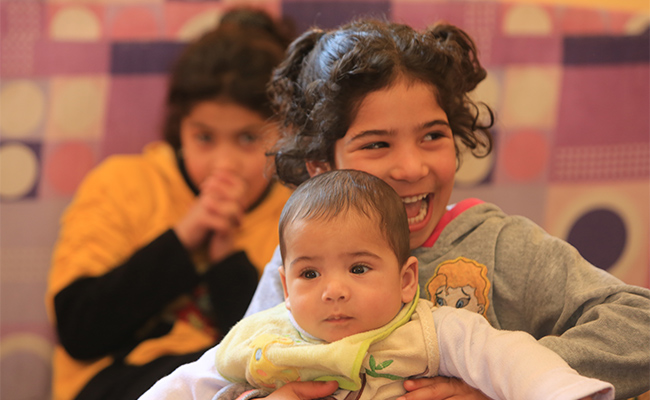
Baby born on the border
 Baby Adil and sister. Photo: Ibrahim Malla/ British Red Cross
Baby Adil and sister. Photo: Ibrahim Malla/ British Red Cross
“Before, we were happy with no problems. We don’t know anything about politics. We just think about our children.”
Hassan* and Rima* sit cross-legged in an almost-bare room with a hole in the ceiling. Their five children including 4 month old Adil play nearby.
“We used to live in a village near Homs. We left there after armed men came and tried to take everyone in the local villages. There was bombing. So many people were killed.”
“Men came to the house, they attacked me. The men damaged everything inside the house, then the house itself. I had to think about what my children were seeing. It was too dangerous, we had to move to safety. We had another house in another village, a family house on a farm. We moved there. But even there, there was many parties were fighting each other. There was still bombing.”
The family travelled to Dera’a but due to fighting near the border they had to wait there for four months before they could make the final part of their journey. Eventually Rima, who was by this time heavily pregnant, had to make the journey without Hassan. She took the children with her but spent six days in the desert trying and failing to reach the border. Eventually they made it, but Rima had gone into labour and had to give birth on the border, in a field hospital.
Rima explains: “It was a bad trip to the Jordanian border. Small children, walking across the desert, and just a small bottle of water with us. We were very afraid. The Jordanian army took us in and registered us. Adil was born in a field hospital on the border. My other children had been born naturally but I had already spent six days in the desert and I was scared about his birth.”
“Thankfully the medical centre here is free. We would like to say thanks to the Jordanian people - for the security, for the medical help - thank you.”
Hassan was reunited with his family two months later. His brother is helping the family to cover the rent for this apartment. It has two rooms, one of which has a hole in the ceiling. It’s cold and for obvious reasons there is a draft coming through the building. Hassan is grateful, but understandably frustrated.
“Before, we had everything for the house - a fridge, washing machine - but the men who came to my house took it all, and then they burnt the house.”
The conflict has had a dramatic impact on the lives of their children. Hassan and Rima left Syria to protect their children, but not before they had been subjected to some of the horrors of war. Anya*, their middle daughter, doesn’t talk much anymore. She witnessed their house being burnt down and it badly affected her.
“They saw this! When their house was burnt! Bilal also, he has been wetting the bed since then. Anya hasn’t talked much since the bombing started.”
As well as Red Cross coupons for bread, milk and gas, the family are receiving some psychological support. The children attend the Jordanian Red Crescent psycho-social project in Amman, where they are able to play with other children, which helps them feel more normal and cope with their feelings. There are more structured sessions to help them deal with their experiences. Their oldest daughter Iman is nine and desperately wants to get back to school. She loves painting and learning English, but is worried she’ll forget what English she knows because she hasn’t been to school in so long.
Even though his family are safe, Hassan worries about those who he left behind.
“We have relatives in Syria but we don’t know what happened to them. We want to go home. My father is back home but he is refusing to leave. For older people it is hard to leave, they just want to stay in the home that they know. He wants to stay in his house, he says he will die there.”
*names have been changed